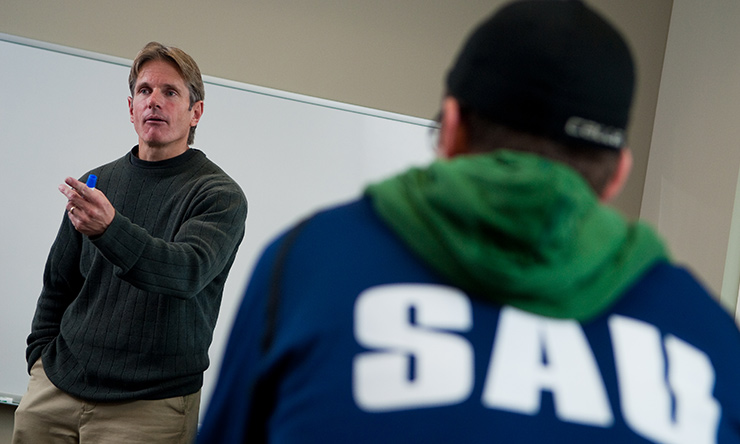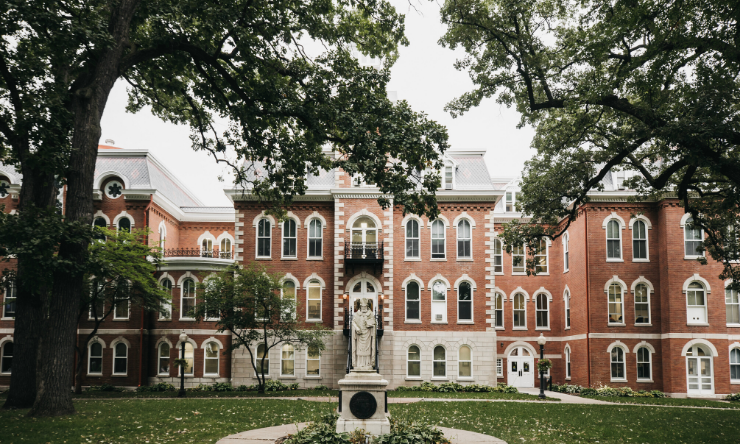Master of Science in Criminal Justice
**Not currently accepting applications**
With a focus on analytics, data interpretation, and crime analysis, our Master of Science in Criminal Justice degree will get your career going in the right direction.
Careers with this degree include crime analyst, criminal justice intelligence officer, data diagnostics, and others in the criminal justice field.
Ambrose Advantages
- Small Class Sizes
- Conduct Relevant Research Alongside Professors
- 1-on-1 Attention From Professors



As a master's degree student at St. Ambrose, you will learn from experienced instructors who have worked in the criminal justice field. Their on-the-job insights help add context to a curriculum that has today's criminal justice careers in mind.
Read our MSCJ Fact Sheet (pdf)
More Information about the MS in Criminal Justice
Courses for this degree center on decision-making, analytic techniques, and data programming languages. These are intended to strengthen your analytic and writing capabilities which are important for careers in data diagnostics, crime analysis, and criminal justice intelligence.
As is customary in the criminal justice department at St. Ambrose, you will conduct research on a regular basis with SAU faculty. Our students have co-authored manuscripts with faculty and presented papers at national academic conferences and journals.
Once you've completed the required coursework, you will complete a thesis or internship. Your thesis will be a research project that involves data collection and analysis, followed by a defense to your thesis committee. An internship will occur during your final two semesters of coursework and includes 240 hours of on-site work plus a comprehensive exam.
If your goal is an upper-level career in law enforcement, security, corrections, or human services, our Master of Criminal Justice program can prepare you to be a skilled, effective, and ethical leader.
If you are an undergraduate considering a career in criminal justice, learn more about your first step and our Criminal Justice program.
A limited number of graduate assistantships and fellowships are available. Check with the program director for details.
In addition, the St. Ambrose University Financial Aid Office provides information on loans for graduate studies.
2022-23 Tuition
- $1,080/credit hour seated and online (some discounts may apply)
Refund Schedule: Students are obligated for the full amount of tuition for courses for which they are registered, subject to the refund schedule. Exact refund dates for each term are located in the campus Academic Calendar.
- You have 10 days to make changes to your enrollment without penalty.
- You will be charged 50% of tuition through the 20th day if you drop below 9 credit hours (full-time); or, if you are already a part-time student and you drop below your original enrolled credits. If you received financial aid of any kind, your package will be re-evaluated and possibly adjusted to reflect your new enrollment status.
- Any changes made after the 20th day will result in a full charge of tuition.
This rule does not apply if you fully withdraw from the university. In that case, your tuition will be prorated based on the number of days attended.
2023-24 Fees
Graduate level students taking 9 or more credit hours $280/yr. ($140/semester)
Graduate level students taking 8 or less credit hours $140/yr. ($70/semester)
Nicole Pizzini, PhD, Chair and Professor
Chris Barnum, PhD, Professor
Regina Matheson, PhD, Professor
Zachary Carlisle, PhD, Assistant Professor
Jeffrey McCraw, JD, Lecturer
Degree Requirements
View Master of Science in Criminal Justice courses and descriptions in the online course catalog
Required
MSCJ 500 Advanced Criminological Theory, 3 credits
MSCJ 530 Research Design and Methods, 3 credits
MSCJ 531 Advanced Data Analysis and Data Driven Decision Making, 3 credits
MSCJ 670 Contemporary Issues in Law and Juvenile Justice, 3 credits
MSCJ 671 Contemporary Issues in Law Enforcement, 3 credits
MSCJ 672 Contemporary Issues in Corrections, 3 credits
MSCJ 675 Ethical and Social Responsibility in Criminal Justice, 3 credits
MSCJ 680 Thinking Critically About Criminal Justice, 3 credits
MSCJ 685 Research I, 3 credits
MSCJ 700/690 (2 semesters) Internship/Thesis option Fall/Spring MSCJ 690, 6 credits
Internship option Fall/Spring MSCJ 700, 6 credits
Spring MSCJ 701 Comprehensive Exam, 0 credits
This is the suggested course sequence to earn your MSCJ degree.
Year One
| Fall | Credits | Spring | Credits |
|---|---|---|---|
| MSCJ 680 Critically Thinking About Criminal Justice | 3 | MSCJ 685 Research I | 3 |
| MSCJ 500 Advanced Criminological Theory | 3 | MSCJ 672 Contemporary Issues in Corrections | 3 |
| MSCJ 670 Contemporary Issues in Law and Juvenile Justice | 3 | MSCJ 530 Research Design & Methods | 3 |
| Total Credits | 9 | Total Credits | 9 |
Year Two
| Fall | Credits | Spring | Credits |
|---|---|---|---|
| MSCJ 531 Advanced Data Analysis & Data Driven Decision Making | 3 | MSCJ 700/690 Internship or Thesis | 3 |
| MSCJ 671 Contemporary Issues in Law Enforcement | 3 | MSCJ 675 Ethical and Social Responsibility in Criminal Justice | 3 |
| MSCJ 700/690 Internship or Thesis | 3 | MSCJ 701 Comps or Defense | 0 |
| Total Credits | 9 | Total Credits | 6 |
To gain admission to the MSCJ as an undergraduate – with the aim of completing a bachelor's and master's degree within five years – students must submit a University application for admission, one letter of recommendation, and meet with the program director.
Plan to Graduate
This is the suggested course sequence to begin graduate studies during the junior year at SAU.
Junior year:
Fall - MSCJ 680
Spring - MSCJ 530
Senior year:
Fall - MSCJ 500 and MSCJ 531
Spring - MSCJ 685
Graduate (5th) year:
Fall - MSCJ 671, MSCJ 670 and MSCJ 700/690 (Internship/Thesis - you will choose one. The internship option includes the comprehensive exam MSCJ 701 - 0 credit).
Spring - MSCJ 675, MSCJ 672, and MSCJ 700/690
Year One
| Fall | CR | Spring | CR |
|---|---|---|---|
| CRJU 101 Intro to Criminal Justice | 3 | CRJU 231 Contemporary Corrections* | 3 |
| ENGL 101 English Composition | 3 | CRJU Justice Issues Elective* | 3 |
| Philosophy/Theology | 1 | Oral Communication (COMM 129, 132, 228, 230 or 329) | 3 |
| Foreign Language 101 | 3 | Foreign Language 102 | 3 |
| NSS 101 New Student Seminar | 1 | MATH 131 or 171 | 3 |
| IL 101 Information Literacy | 1 | KIM 149 Wellness Concepts | 1 |
| Total Credits | 15 | Total Credits | 16 |
Year Two
| Fall | CR | Spring | CR |
|---|---|---|---|
| CRJU 102 Intro to Law Enforcement | 3 | CRJU 200 Research Methods in Sociology & CJ* | 3 |
| CRJU 221 Criminal Law and Procedures* | 3-4 | CRJU 316 Juvenile Justice* | 3 |
| Elective/2nd Major/Minor Course | 3 | Elective/2nd Major/Minor Course | 3 |
| Humanities# | 3 | Creative Arts | 3 |
| Natural Science | 3 | Philosophy/Theology | 3 |
| KIN Activity | 1-2 | ||
| Total Credits | 16-17 | Total Credits | 15 |
Year Three
| Fall | CR | Spring | CR |
|---|---|---|---|
| CRJU 430 Data Analysis in Social Research** | 4 | CRJU 303 Police, Problems and Practices* | 3 |
| WI-CRJU 400 Criminology Theory* | 3 | CRJU 314 Probation, Parole, and Community Corrections* | 3 |
| Elective/2nd Major/Minor Course | 6 | Elective/2nd Major/Minor Course | 9 |
| Philosophy/Theology# | 3 | MSCJ 530 Research Design and Methods | 3 |
| MSCJ 680 Thinking Critically About Criminal Justice | 3 | ||
| Total Credits | 16 | Total Credits | 15 |
Year Four
| Fall | CR | Spring | CR |
|---|---|---|---|
| WI-CRJU 407 Seminar in Criminal Justice** | 3 | CRJU Just Issues Elective* | 3 |
| CRJU 411 Constitution and Criminal Justice* | 3 | Elective 2nd Major/Minor Course* | 12 |
| Elective/2nd Major/Minor Course* | 6 | MSCJ 685 Research I | 3 |
| 300 Level Philosophy/Theology | 3 | ||
| MSCJ 500 Adv. Criminological Theory | 3 | ||
| MSCJ 531 Adv. Data Analysis & Data Driven Decision Making | 3 | ||
| Total Credits | 15 | Total Credits | 15 |
Graduate Year
| Fall | CR | Spring | CR |
|---|---|---|---|
| MSCJ 700/690 Internship or Thesis | 3 | MSCJ 700/690 Internship or Thesis | 3 |
| MSCJ 671 Contemporary Issues in Law Enforcement | 3 | MSCJ 675 Ethical and Social Responsibility in CJ | 3 |
| MSCJ 670 Contemporary Issues in Law and Juvenile Justice | 3 | MSCJ 672 Contemporary Issues in Corrections | 3 |
| Presentation or Comps | 0 | ||
| Total Credits | 9 | Total Credits | 9 |
Contact
Tony Ketelaar, Director of Graduate Admissions
Admissions and Welcome Center
518 W. Locust St.
Davenport, IA 52803
563-333-6312
MSCJ@sau.edu
